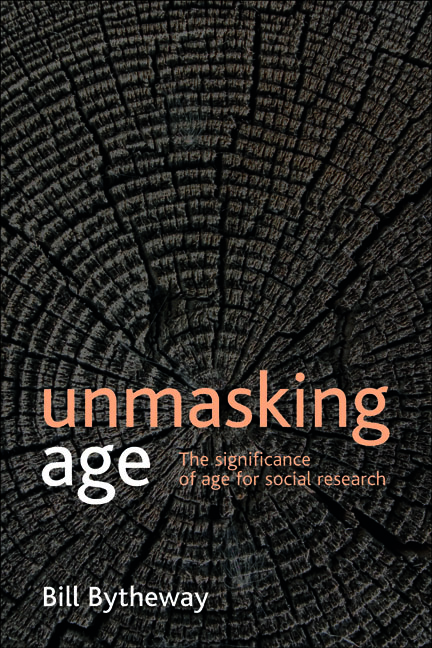Book contents
- Frontmatter
- Dedication
- Contents
- List of figures and tables
- Acknowledgements
- one Introducing age
- two Researching age
- three Age and time
- four Representations of age
- five Growing older in an ageing body
- six Being older
- seven A great age
- eight The ageing population
- nine Gerontologists and older people
- ten Getting real
- Postscript
- Notes
- Appendix
- References
- Index
- Frontmatter
- Dedication
- Contents
- List of figures and tables
- Acknowledgements
- one Introducing age
- two Researching age
- three Age and time
- four Representations of age
- five Growing older in an ageing body
- six Being older
- seven A great age
- eight The ageing population
- nine Gerontologists and older people
- ten Getting real
- Postscript
- Notes
- Appendix
- References
- Index
Summary
In writing this book I have tried to focus on the concept of age and to examine critically how it is used in social research and gerontology. Is age real? Of course it is: it is clearly evident that our bodies age in fairly standard, predictable and visible ways. As Mike Hepworth has argued:
… sociologists do not deny that ageing is a process of biological change; rather they wish to draw attention to the social and personal implications of the ways in which the meanings of biological change as ‘decline’ are culturally constructed and interpreted through discourse. (2003, p 90)
And it is not just the assumption of decline that we might challenge. The reasoning that starts with the various physical signs of age and ends in the conceptualisation of ‘age’ is essentially the result of a history extending over many nations and centuries, a history that has engaged many disciplines and occupations as well as biologists. Out of much observation, listening, reading and thought about how individual lives change with time, age has emerged: it now occupies an undisputed position in popular conversation as something that is real, something we all have to live with. So my overall aim involves examining how this belief is sustained. In believing that age exists, are we simply facing up to the reality of our ageing bodies? Are we recognising hard facts and their consequences? Or are we setting up ways of institutionalising assumptions and tensions, and making life all the more difficult for ourselves as a consequence?
I set about answering these questions by reflecting on the state of gerontology, by drawing on my recent, and not-so-recent, experiences of researching age, and by tapping into some other sources of insight. As a social researcher, my objective has been to collect evidence that casts light on age as it affects and is experienced by human populations, preferably from different angles, posing challenges to the ‘received wisdom’. This entails the deployment of various methods, acquiring access to different sources of information and undertaking original analyses. At the end of this chapter, I will reflect on how social research in the future might develop in ways that increase our understanding of age.
- Type
- Chapter
- Information
- Unmasking AgeThe Significance of Age for Social Research, pp. 207 - 216Publisher: Bristol University PressPrint publication year: 2011



